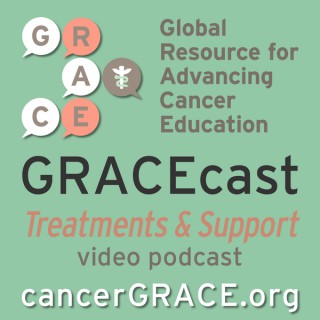Podcasts about pardoll
- 7PODCASTS
- 12EPISODES
- 22mAVG DURATION
- ?INFREQUENT EPISODES
- Sep 12, 2021LATEST
POPULARITY
Best podcasts about pardoll
Latest podcast episodes about pardoll
Osteosarcoma Update from Dr. Huang - 2019 OutSmarting Osteosarcoma recipient
Osteosarcoma Update from Dr. Huang - 2019 OutSmarting Osteosarcoma recipient Dr. Huang is back on OSTEOBites to give us an update on his research funded by OutSmarting Osteosarcoma 2019. Don't miss this exciting new episode, plus who doesn't love Dr. Huang? ABOUT Alex Huang, MD, PhD: Dr. Huang received a B.S. in chemistry and an M.S. in biochemistry and molecular biology from the University of Chicago. He then entered the medical scientist training program at the Johns Hopkins University School of Medicine, where he completed his Ph.D. thesis in the laboratory of Drew M. Pardoll, M.D., Ph.D. Dr. Huang's Ph.D. thesis included studying the process of in vivo tumor-antigen cross-presentation by bone marrow derived professional antigen presenting cells and identified the dominant MHC class-I restricted tumor rejection antigen, AH-1, in a murine colon tumor model. Hosted by: Executive Director of MIB Agents - Ann Graham OsteoWarrior and MIB Junior Board Member - Shannon McCormack MIB Super Volunteer Amy Woodchecke PA-C. LINKS: VIDEO of this Podcast: https://youtu.be/eRTS2S8li-I BOWS: https://www.mibagents.org/bows ANGEL WALL: In memory of OsteoAngels: https://www.youtube.com/watch?v=M6Cbe-1m72s&t=558s Note: Note: Dr. Huang's cousin, Wenwei is at 9:18 HUANG LAB: http://www.huanglab.com Dr. Huang's Email: alex.y.huang@case.edu Clinical Trial Search: www.mibagents.org/physicians-researchers/clinical-trials … What We Do at MIB Agents: PROGRAMS: ✨ End-of-Life MISSIONS ✨ Gamer Agents ✨ Agent Writers ✨ Prayer Agents ✨ Healing Hearts Bereaved Parent Support ✨ Ambassador Agents - Peer Support EDUCATION for physicians, researchers and families: ✨ OsteoBites, weekly webinar & podcast with thought leaders and innovators in Osteosarcoma ✨ MIB Book: Osteosarcoma: From our Families to Yours RESEARCH: ✨ Annual MIB FACTOR Research Conference ✨ Funding $100,000 annually for OS research ✨ MIB Testing & Research Directory ✨ The Osteosarcoma Project partner with Broad Institute of MIT and Harvard ... Kids are still dying with 40+ year old treatments. Help us MakeItBetter.
Cancer Matters with Dr Bill Nelson - Cancer Immunotherapy
Dr Bill Nelson speaks with Dr Drew Pardoll, the Director of the Bloomberg~Kimmel Institute for Cancer Immunotherapy, about the progress being made in empowering patient's own immune system to combat their cancer.
Questions & Answers with Drs. Pardoll, Hellmann, and Luke; Moderated by Dr. West
Immunotherapy Forum Video #7: Drs. Pardoll, Hellman, and Luke sat for a moderated Q&A with Dr. Jack West.
Questions & Answers with Drs. Pardoll, Hellmann, and Luke; Moderated by Dr. West
Immunotherapy Forum Video #7: Drs. Pardoll, Hellman, and Luke sat for a moderated Q&A with Dr. Jack West.
Questions & Answers with Drs. Pardoll, Hellmann, and Luke; Moderated by Dr. West
Immunotherapy Forum Video #7: Drs. Pardoll, Hellman, and Luke sat for a moderated Q&A with Dr. Jack West.
Immunotherapy Forum Video #2: In Part 2 of 2 videos on this topic, Dr. Drew Pardoll from the Kimmel Cancer Center at Johns Hopkins explains what immunotherapy is and how it helps cancer patients live longer - many for five years or more.
What is Immunotherapy and its Mechanisms of Action? Part 2
Immunotherapy Forum Video #2: In Part 2 of 2 videos on this topic, Dr. Drew Pardoll from the Kimmel Cancer Center at Johns Hopkins explains what immunotherapy is and how it helps cancer patients live longer - many for five years or more.
What is Immunotherapy and its Mechanisms of Action? Part 2
Immunotherapy Forum Video #2: In Part 2 of 2 videos on this topic, Dr. Drew Pardoll from the Kimmel Cancer Center at Johns Hopkins explains what immunotherapy is and how it helps cancer patients live longer - many for five years or more.
Immunotherapy Forum Video #1: In Part 1 of 2 videos on this topic, Dr. Drew Pardoll from the Kimmel Cancer Center at Johns Hopkins explains what immunotherapy is and how it helps cancer patients live longer - many for five years or more.
What is Immunotherapy and its Mechanisms of Action? Part 1
Immunotherapy Forum Video #1: In Part 1 of 2 videos on this topic, Dr. Drew Pardoll from the Kimmel Cancer Center at Johns Hopkins explains what immunotherapy is and how it helps cancer patients live longer - many for five years or more.
What is Immunotherapy and its Mechanisms of Action? Part 1
Immunotherapy Forum Video #1: In Part 1 of 2 videos on this topic, Dr. Drew Pardoll from the Kimmel Cancer Center at Johns Hopkins explains what immunotherapy is and how it helps cancer patients live longer - many for five years or more.
Establishing immunotherapy as a standard in cancer treatment: Dr Drew Pardoll
Prof Drew Pardoll talks to ecancer at the 2013 WIN Symposium in Paris about the recent developments in treating cancer with immunotherapy. Immunotherapy for cancer aims to empower the immune system's antibodies and T-Cells to attack tumours. This occurs through the blockade of regulatory pathways, immune checkpoints, and the reactivation of T-Cells. The most recent breakthrough in this field has been the results in blocking PD-1 with ipilimumab.










